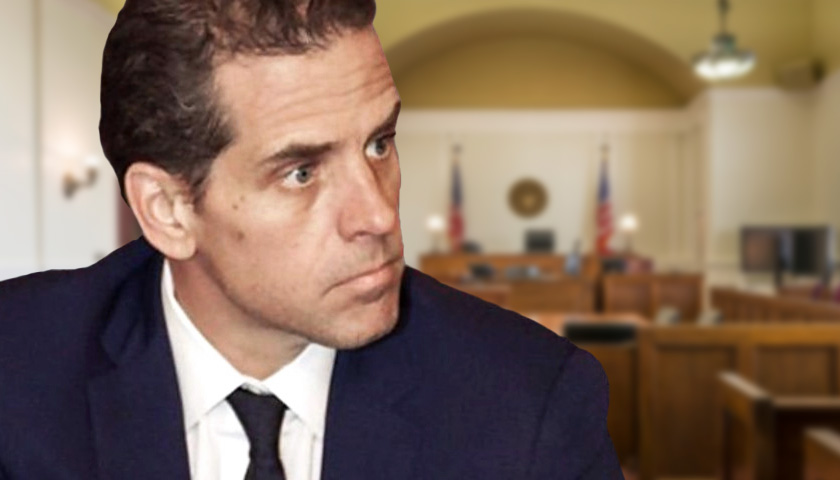by Steven Richards
Defense lawyers are approaching Hunter Biden’s felony gun trial with a strategy to paint the first son as the victim of his drug addiction but at the same time convey that he did not believe he was an addict when he allegedly lied on a federal firearm purchase form.
The defense argument, described by one legal analyst as “remarkably clever,” is designed to sow reasonable doubt in the jurors’ minds that Biden had full knowledge he was lying when he marked that he was not using drugs on the purchase form when he bought a firearm in Delaware in 2016. At the same time, the defense attempted to paint Biden as a victim of his own addictions, possibly to elicit sympathy from the jury.
Hunter Biden was charged in Delaware by Justice Department special counsel David Weiss with three felony crimes in connection to 2018 firearm purchase while he was using drugs. The accusations include lying to the licensed gun dealer, making a false claim on the application used to screen firearm’s buyers by declaring he was not a drug user, and illegally possessing the firearm for 11 days.
Biden’s high-powered defense attorney, Abbe Lowell, who has represented clients like Ivanka Trump, Jared Kushner, and embattled New Jersey Senator Bob Menendez, attempted to argue Wednesday that his client did not believe that he had an addiction at the time that he purchased the gun in an effort to seed doubt that Biden intended to lie on the form.
In his opening statement, Lowell emphasized that the jury will have to consider Biden’s “state of mind” when he entered that gun store in 2016. He also sought to paint a picture of his client that the jurors could relate to, saying that Biden abused both alcohol and drugs “like literally millions of people in this country” and suffered from “traumas” related to his family tragedies, including the death of his mother in a 1972 car crash.
“In order to get the jury to kind of disregard some things, first you need to make them want to acquit your client,” defense lawyer Ron Kuby told CNN. “It’s a redemption here — here was this drug addict and now here is this fine-looking, clean, sober man. The jury is going to want to find a reason to vote not guilty.”
However, legal analyst Jonathan Turley, a professor at the George Washington University School of Law, believes Lowell’s argument is undermined by the public comments of his own client.
“The sole issue in this case is whether Biden filed a false gun form (ATF Form 4473) in which, as a condition for his purchase of a .38-caliber Colt Cobra revolver from the StarQuest Shooters and Survival Supply in Wilmington, Del., he stated that he was not a user of drugs,” Turley wrote in a column posted to his website.
“Biden’s counsel, Abbe Lowell, previously suggested that his client may have had a window of sobriety when he signed the form, but then returned to his addiction afterward. But then Hunter himself blew that theory away with his public comments and books,” he continued.
As recently as this year, Hunter Biden has publicly spoken about his challenges with drug addiction and how he views continued sobriety as central to helping his father win reelection, thereby admitting his past addiction.
“Most importantly, you have to believe that you’re worth the work, or you’ll never be able to get sober. But I often do think of the profound consequences of failure here,” Biden told Axios earlier this year. “I have something much bigger than even myself at stake. We are in the middle of a fight for the future of democracy,” he added.
Turley believes Biden’s defense centers on convincing the jury to acquit the first son using a strategy called jury nullification—where the jury rejects evidence and refuses to follow the law to send a message about a related social issue or because the result may offend a jury’s sense of justice or fairness, according to the Cornell Law School Legal Information Institute.
Turley says the combination of the favorable jury pool—Joe Biden received 60% of Delaware’s vote in the 2020 election—and any sympathy from jurors for a past struggle with addiction may make this strategy viable.
Indeed, more than two dozen of the 65 potential jurors the court sorted through on Monday know someone who had faced addiction and substance abuse.
“My childhood best friend passed away from an overdose,” one juror said, according to the BBC. Others explained how relatives suffered from opioid or alcohol addictions—some of whom who have now died.
The jury looks like a microcosm of the United States population in this regard. A recent John Hopkins University study published in May found that 32% of the population have lost someone they know to a drug overdose. Those who experienced this loss were more likely to view addiction as “an extremely or very important policy issue.”
“Trying a Biden in Delaware is a challenge for any prosecutor, even without the potential sympathies for a reformed drug addict. With the first lady sitting behind him, the family ties will be on full display. There is an understandable parental desire to show emotional support for Hunter, but prosecutors cannot be thrilled by the potential effect on jurors in the pro-Biden state,” Turley wrote.
– – –
Steven Richards is a reporter for Just the News.









